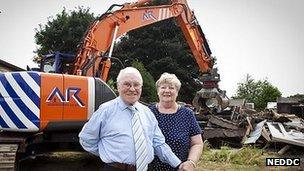Eckington and Killamarsh prefab estate demolition begins
- Published

Residents said seeing the houses go was emotional but praised the council's consultation
Demolition work has begun on an estate of 1940s prefabricated houses in Derbyshire.
Constructed after World War II to replace bombed-out homes, the bungalows came as a kit of concrete panels and ready-made fittings.
North East Derbyshire District Council said the 99 "Tarran" houses in Eckington and Killamarsh were difficult to heat and had structural defects.
They will be replaced by 130 new properties as part of a £10.5m scheme.
Betty Hill, from the council, said: "We are very proud to be leading the creation of new council homes in North East Derbyshire - the first for a generation.
"This scheme is a huge investment in the future of our communities and is part of our wider commitment to the regeneration of homes across the district."
Nigel Barker, chair of Rykneld Homes, which manages the council's housing stock, added: "The involvement and support of tenants has been a very important part of this scheme and it will be great to stand side-by-side with them to watch the official start of work to create their new homes.
"This will be the end of an era for many tenants, who have brought their families up in these houses. While it will be sad to see a piece of history laid to rest, tenants are looking forward to having modern, warm homes with all the facilities they need."
Tenant Dennis Green, who has lived on the estate for 50 years, said: "I've brought my family up on this estate so it really is an end of an era.
"While I was a little sad at first think that the homes would be pulled down, I'm now looking to the future in my new home."
Originally intended to last only 10 years, remaining prefabs have become symbolic of the austerity which followed WWII.
Six on the Excalibur Estate in Catford, south London, have been given listed status ahead of the planned demolition of the rest.
Two from North East Derbyshire will be dismantled and preserved by local history groups.
- Published8 May 2013
- Published4 April 2012